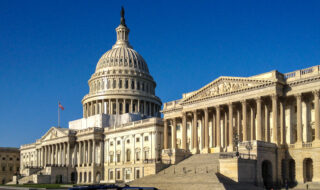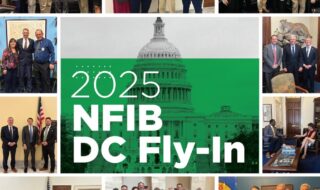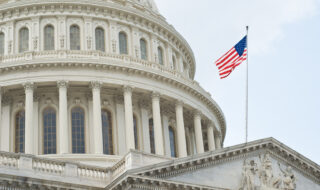June 13, 2022 Last Edit: June 5, 2025
Minnesota 2022 Legislative Session Recap: How Small Business Fared
With this year’s regular session of the Minnesota Legislature behind us – and no special session yet scheduled – it’s a good time to take a look at how NFIB Minnesota’s priorities fared.
Check out our 2022 Session Priorities here: 2022 Minnesota Session Preview – Part II (nfib.com).
Stopping Unemployment Insurance Tax Hikes: Success.
NFIB Minnesota began working last year on a plan to stop massive employer payroll tax hikes on small businesses arising from the pandemic-drive surge of unemployment claims. Heading into 2022, the state’s unemployment program was nearly $3 billion below mandatory solvency requirements, including over $1 billion owed to the federal government. This would have triggered a decade or more of tax hikes on all employers to refill the fund.
NFIB Minnesota members worked hard – at the Capitol, in the media, and in hundreds of messages to lawmakers – to stop these unfair tax hikes. Ultimately, we successfully secured $2.7 billion in state and federal funds to prevent higher UI payroll taxes. This saves the average employer 30% on their UI bill for the next 10 years.
Continuing Individual Market Reinsurance: Success.
In the years after the Affordable Care Act (“Obamacare”) was implemented in Minnesota, premiums in the individual market skyrocketed for most around the state. Individuals and families saw their insurance costs go up by double digits year after year, doubling or tripling within a few years. As a result, over 100,000 people dropped their individual market coverage between 2014 and 2017.
In 2017, the Minnesota Legislature created the “reinsurance” program to stop the collapse of this market and preserve it as an option for self-employed entrepreneurs, small business owners and workers who rely on it for coverage. Funded by a mix of existing federal and state dollars (not by new taxes or fees), reinsurance lowers individual market premiums by 20-25% every year.
Until 2022, the reinsurance program had to be reauthorized almost every year. This year, we secured a three-year extension of the program. This will create more stability and predictability for the more than 150,000 people who still get their coverage in the individual market.
Blocking Harmful Employer Mandates & Penalties: Success.
Small business owners faced an avalanche of mandates this session. Just a few of the bills that advanced in the DFL-run Minnesota House include:
- 24-week, State-Run Paid Leave Mandate funded by a new $1 billion/year payroll tax (see the bill authors)
- Six Day Paid Sick Leave Mandate for all employees (see the bill authors)
- Jury Duty Paid Leave Mandate (see the bill authors)
- Warehouse Worker Paperwork Requirements, Red Tape and Penalties (see the bill authors)
- Ban and Penalties on Small Employer Noncompete Agreements (see the bill authors)
- Ban and Penalties on Job Applicant Pay History Questions (see the bill authors)
- Double OSHA Fines (see the bill authors)
NFIB Minnesota worked with the Minnesota Senate to block all of these harmful proposals and more. Small business owners know how to run their business a lot better than politicians in St. Paul.
See NFIB MN’s op-ed in the Rochester Post-Bulletin on the 24 Week Paid Leave Boondoggle: John Reynolds: Math won’t work on paid leave mandate for Minnesota small business – Post Bulletin
Blocking Taxpayer-Funded Electric Vehicle Subsidies: Success.
In our 2022 State Ballot, NFIB Minnesota members overwhelmingly opposed (94%) taxpayer-funded subsidies for electric vehicles. Yet, the Minnesota House passed a package that i) imposed new taxes on energy in order to fund hundreds of millions in subsidies for EVs, ii) mandated a minimum number of EV charging parking spots in every commercial parking lot, and iii) gave away millions in Xcel-ratepayer funded subsidies for EV chargers.
Small businesses stepped up to the plate and sent hundreds of messages to lawmakers opposing these subsidies. Your voice and our advocacy helped stop these wasteful tax-and-giveaway schemes. At the end of session, not a dollar of additional state taxpayer money went to EV subsidies.
See NFIB MN’s op-ed in the St. Cloud Times on these proposals: Your Turn: There’s an energy tax hiding in electric vehicle subsidies (sctimes.com).
Preserving Affordable Energy Options: Partial Success.
Around the country, progressive politicians are moving to ban natural gas, propane, and other gas/liquid fuels. These fuel bans have become a trend in liberal coastal states, with New York proposing a near-total ban on natural gas in new construction starting in 2027. They want an all-electric future, which they believe will lead to “net zero emission” buildings.
This year, the Minnesota House advanced requirements that all new commercial and industrial buildings be “net zero” by 2036 and to allow local governments to adopt stricter energy codes (which could lead to local bans). NFIB Minnesota testified against these expensive and impractical proposals, and they did not become law.
On the other hand, the Minnesota Senate passed an NFIB-backed proposal to prohibit local governments from adopting bans on the use of natural gas and propane, which preserves energy options for small businesses (see the bill authors).
Small businesses need the ability to make the best decisions for themselves, their customers, and their employees. This includes how to affordably power, heat and run their operations. Unfortunately, this proposal did not become law.
For now, local governments remain barred by the state building code from adopting these bans.
Permanent Small Business Tax Relief: Incomplete.
Minnesota small businesses are badly over-taxed. The state has a $9.25 billion surplus (that will grow to ~$12 billion next year) despite state spending increasing by nearly 50% in the last ten years. Spending has gone up by billions every two years, and the government still is running a surplus.
We need permanent reductions to individual and business income taxes, elimination of the statewide property tax levy (C/I property tax), conformity to the federal estate tax exclusion, and more reform.
The GOP-led Minnesota Senate passed, with bipartisan support, a significant cut to individual income tax rates and a 10-year phase out of the statewide property tax (reducing by 10% per year). However, House DFLers and Gov. Walz resisted this approach. It did not become law and the surplus remains in the hands of government after the end-of-session deal fell apart.
We’ll be working hard this summer and fall to set the stage for major tax relief next session.
Repealing California Cars Rules: Incomplete.
NFIB Minnesota members strongly oppose (98.5%) the Walz Administration’s California Cars Rules, which impose California’s stricter emissions standards and EV minimum requirements on Minnesota consumers and auto dealers.
We supported a bill to repeal California Cars and stop unelected bureaucrats from importing more bad ideas from the Golden State (see the bill authors). It passed the Senate but did not become law this year.
See NFIB MN’s op-ed in the Duluth News Tribune on California Cars: Statewide View: We need Minnesota to stop importing bad ideas from California – Duluth News Tribune.
Emergency Powers Reform: Incomplete.
This year, NFIB Minnesota developed a new proposal to reform the emergency powers used by Gov. Walz during the first 18 months of the COVID-19 pandemic.
Small businesses – and the people elected to represent them in the state legislature – were largely shut out of decision making during the pandemic. Main Street stores were closed with little or no notice while big box stores selling the same goods inexplicably remained open.
NFIB’s proposal would protect small businesses and establish a system of checks and balances in the event of a future peacetime emergency (see the bill authors).
- For orders or rules issued after the first 10 days of a peacetime emergency, a seven-day notice is required and affected entities must be consulted in advance.
- Rules and orders under a peacetime emergency expire after 30 days unless continued by a majority in both houses of the Minnesota Legislature.
- The burden of enforcement for rules or orders cannot be shifted from government to private businesses or citizens without their consent.
This framework strikes a balance by providing an initial window to react to peacetime threats while establishing a more cooperative process during the remainder of an emergency. We will continue to work on this needed reform in 2023.
COVID-19 Lawsuit Liability Protection: Incomplete.
During the COVID-19 pandemic, Minnesota businesses have gone to great lengths to not only protect their customers and employees but to also pitch in to help the state. In 2021, the Minnesota Senate advanced a bill to protect businesses that follow relevant governmental guidance on reducing the risk of COVID-19. They would have been shielded from legal costs and potential liability as a result of speculative lawsuits that seek to take advantage of a crisis.
Unfortunately, this bill did not become law. For now, we remain vigilant about these types of frivolous lawsuits and continue seeking a legislative remedy next year.
NFIB is a member-driven organization advocating on behalf of small and independent businesses nationwide.
Related Articles














